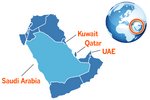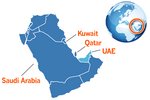Over the past few decades, the day-to-day lifestyle of Saudi Arabia has changed dramatically. The majority of Saudis now live in cities, spending large amounts of time at office desks and in cars. As a result, they are now more sedentary than they were when living in rural villages. A large number of Saudis are heavy smokers; the diet has become Westernized and, of course, the major fast food restaurants are now well entrenched in the country Consequently, the number of new cancer cases has increased by more than 25% in the last 25 years, and it is expected to rise even more quickly. By the year 2020 and 2030, there is expected to be an approximately 6- and 10-fold rise among males as compared with the incidence in 2004, and a 5- and 8-fold increase among females. The highest cancer incidence would be expected for middle-aged and elderly Saudis.
Among women, the top five cancers are breast, thyroid, colorectal, Non-Hodgkin’s lymphoma, and leukemia, while among men, the top five cancers are colorectal, Non-Hodgkin’s lymphoma, leukemia, liver, and lung. Genetic factors contribute to a higher incidence of relatively rare skin cancers, such as Kaposi sarcoma. In addition, Ophthalmologists at the King Khaled Eye Specialist Hospital in Riyadh, have told me of rare eye cancers, which are probably caused by the year-round exposure to sunlight.
To meet the growing demand for cancer services, the King Faisal Specialist Hospital in Riyadh opened a freestanding tower for the treatment of cancer and liver diseases in autumn 2017. The King Abdullah Centre for Cancer and Liver Diseases (KACCLD) has 23 floors and houses all services supporting oncology and liver diseases:
- Radiation Therapy, Radiation Oncology
- Pharmacy, Phlebotomy, and Apheresis
- Surgery, Endoscopy Suite, PACU, Pre- and Post-
- Infusion Center
- Radiology (2 CT scanners, 2 MRI scanners, 2 PET/CTs, 2 angio suites, 4 ultrasound units, 1 fluoro unit, 3 mammography units, and 2 ultrasound rooms for biopsies)
- Medical Oncology, Surgical Oncology, and various other Clinics
- ICU and Nursing Units (Liver ICU and HDU and MSICU)
- Nursing Units (including Liver Transplant, Surgical Oncology, Palliative Care, Medical Oncology)
- BMT and Hematology wards
In addition to utilizing the most recent methods of dealing with cancer, the centre will also provide much-needed community education programs, to not only identify individuals with genetic risk factors, but also to educate the public on issues around cancer prevention.
Like the West, Saudis are seeing higher cancer rates due to lifestyle issues and an aging population. And, like in the West, they are expanding programs to both prevent and treat the many forms of this disease. If you have experience working with Oncology patients, are interested in seeing rare cases not often treated in the West, and want to be part of opening a new center, this is an exciting time to join the King Faisal Specialist Hospital in Riyadh.














